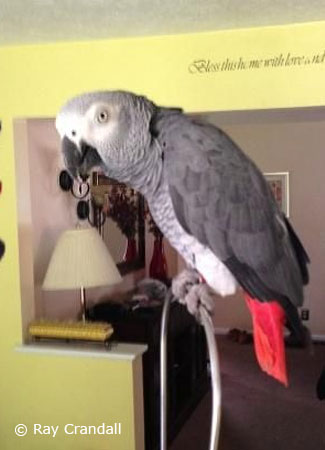Bird hELP CENTER
bird Question:
African Greys and Foraging
I came across this site using search term "how do african grays play
together" our 5 1/2 year old Congo is a wonderful loving bird that is
apparently transcending adolescence. He now is starting to "shuck &
jive" with extreme head movements. And he gets down on the floor to
explore (which we carefully monitor). I want to learn how to play more
with him to stimulate him even more. Boredom can be an issue and we
minimize that as best we can. Also we almost lost him due to mysterious
infection two years ago when I was recovering from prostate cancer
surgery. A good avian vet in buffalo NY saved him for us so we value
this little boy even more now.
My question remains basically about forms of play and maybe there are
techniques that we are unaware of. OBTW he is socialized well and will
do ‘up-up’ with strangers - usually. Sometimes he gets erect feathers in
response but not often.

Answer:
Dear Ray Crandall,
First let me give you my warm wishes on your fight with cancer and I
continue to wish you happiness and health.
Now let's talk about your pet African Grey. It is no secret these highly
intelligent parrots are playful. Many will play for hours on end
swinging, hanging, or climbing about. You had mentioned that your parrot
likes to explore on the ground. This is normal behavior and my pet
African Grey will do the same as well. Let me give you some background
on typical African Grey behavior.
In the rain forests, these birds will group in large numbers and walk
around on the ground consuming clay or fresh shoots. It seems they love
to rummage through the mud looking for all kinds of stuff. Though there
have been no studies conducted as to why greys do this behavior, it is
believed they do so to consume clay to rid them of toxins from the
fruits they eat or to increase their mineral intake. Never the less,
they love to explore on the floor provided they feel secure enough to do
so. With that being said, your little buddy is exhibiting typical grey
behavior and it seems he is happy and healthy.
I love the fact that you are interested in finding other activities for
your bird besides just chewing and swinging. The longer we keep these
parrots the more we come to understand how complex they are. They are
active in the wild and it is no different even though they reside in our
home.
So what kinds of things can you do to satisfy your pet greys need to
forage? There are many things and I'll give you a few examples. Some
owners build foraging boxes. You know those large plastic containers you
slide under your bed to organize your stuff? These work great to allow
your parrot to forage.
These large plastic boxes are perfect as they are not small enough to
encourage nesting, are perfect for the floor, and most importantly easy
to clean. For the foraging box bedding, try using materials such as
shredded paper, alfalfa, Carefresh, or pine shavings. Just be sure your
grey is not consuming any of these materials. Most greys will just chew
them and that's fine. Throughout this bedding sprinkle whole nuts, toys,
or new items that might interest your grey. It might take some time for
him to start using the box, but that's okay. Once he starts to use it he
will enjoy it and this should help satisfy his urge to forage.
You also stated that your pet grey likes to be on the ground. You should
continue to encourage this behavior while the bird is being supervised
by yourself. Objects such as wires, poisonous plants, or fancy furniture
should all be cleared to allow the parrot to forage and play in safety
without too much restriction. Some owners even play games with their
birds on the floor by using toy balls. Most African Greys will thrash
them about or roll on their backs while playing with their toys.
If you want to take it a step further, you could always construct a
large aviary provided you have enough space. This safety zone would be
perfect for the bird to explore outside and soak up some fresh sunrays.
All too often, many captive parrots lack vitamin D. The presence of in a
very would greatly allow the bird to forage and get that extra Vitamin
D.
Best wishes,
IMRAN-C




